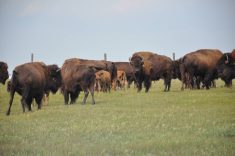Analyzing the composition of manure from animals fed dried distillers grains and assessing meat quality are among projects beef producers funded in recent years.
Each province submits one dollar per animal sold to the national check-off agency and each determines how much they want dedicated to research, said Reynold Bergen, head of the council.
Alberta and Saskatchewan each contribute 20 cents of the $1 checkoff. British Columbia and Nova Scotia give 10 cents, Atlantic Canada and Manitoba earmark five cents of every dollar and Ontario contributes 2.5 cents.
“When the BCRC (Beef Cattle Research Council) gets these funds we leverage them against federal government funds so in general we are able to turn each of our dollars into about $6.50 in other government funding that allows us to get more research underway,” he said at the recent Alberta Beef Producers annual meeting in Calgary.
Read Also

Trump’s tariffs take their toll on U.S. producers
U.S. farmers say Trump’s tariffs have been devastating for growers in that country.
A board of producers awards the money for projects that contribute to sustainability and competitiveness of the beef industry.
Projects are focusing on forage and grass productivity, feed efficiency, as well as animal health and welfare.
Several projects have been completed.
The effect on manure composition after feeding varying levels and types of dried distillers grain was assessed. It was assumed since the nutrient content of the feed changed, the manure would also be different. DDGs provide more fat, fibre, phosphorus, nitrogen, sulfur and protein compared to intact grain.
Cattle groups were fed diets that ranged from no distillers grain to 40 percent made either from corn or wheat.
Wheat based DDGs produced more manure while the corn product did not appear to affect output.
“If you are feeding distillers grain, there is going to be more nitrogen in the manure. It is even more pronounced with wheat distillers grain,” Bergen said.
There was also more phosphorus present so this could have implications for manure applications on farmland.
Another study compared beef quality and marbling when animals have been fed varying levels of DDGs.
There is a greater concentration of oil in the DDGs.
Meat samples were collected, aged for 14 days, examined for retail appearance and cooked for taste panels to assess.
Polyunsaturated fat levels were altered. This may have positive human health benefits but these fats are more likely to oxidize. The meat loses its red colour more quickly and there is a higher risk of spoilage.















